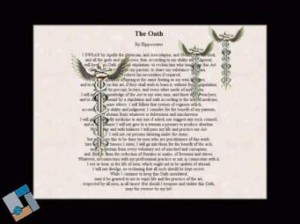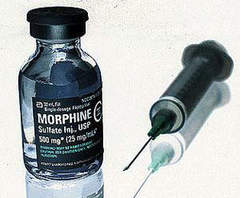In today’s society many people reference hospice workers as the “grim reaper” or “nurse of death”, and don’t fully understand the importance of hospice. Throughout history, little recognition has been given to hospice or palliative care, as it tends to counter everything the Hippocratic Oath stands for. Patients are often hesitant to discuss death or hospice because of the preconceived notion they have of it. They may think they will be given morphine continuously until they are comatose and eventually it causes them to pass away as their respiration’s decrease.

What is Hospice?
Hospice is medical care provided to a patient who if their medical condition were to progress on the expected course, only has less than six months to live due to a terminal disease. However, hospice care also incorporates the patients physical, emotional, spiritual well-being as well as their immediate families. Hospice may take place in the patients own residence, the hospital, nursing home or at an inpatient center to better control their symptoms. Hospice care concentrates on managing a patient’s pain and other symptoms so that the patient may live as comfortable as possible and make the most of the time that remains. Hospice care also believes the quality of life is just as important as their length of life.

Will my family member constantly get morphine?

One common misconception about hospice is that patients are given morphine around the clock, until they pass away. Patients receive morphine to help control any symptoms such as pain or respiratory distress, which have not been properly managed without the use of the narcotic. Either the patient or their family members are asked
- Are they in any pain?
- Are they having any shortness of breath?
- What is the pain like, could you rate it and how is it effecting your daily life?
- Do you want any pain medication to help control your symptoms?
Morphine is also not the first go to method to help control our patients pain. Initially the patient will try other medications and interventions such as re-positioning, heat, ice or distraction to help control their pain. Some patient may only require morphine for a short period of time to better control their symptoms, and once they are stabilized they may be weaned onto another medication, or different dose.
Morphine Myths
- The patient will become addicted
- They will be too sedated to function properly, such as eat or communicate with their family
- Morphine will cause them to die sooner
- It can only be given IV, or from an injection
- Its only given to patients right before they pass away
- The patient should wait to take it until their pain is unbearable before asking for their dose of morphine.
- Nurses are asked to over medicate patients to save the organization money
What are the Levels of Hospice
- Routine: Standard level of care given in the home, long term care facility or assisted living facility. Care includes visits from the hospice nurse, chaplain, social worker and home health aides as well as 24-hour on call nursing support.
- Inpatient Care: Sometimes pain or symptoms cannot be controlled at home, and the patient is taken to a hospital or other inpatient care center. When the symptoms are under control, the patient returns home. Insurance usually covers the cost of inpatient room and board.
- Respite Care : Many patients have their own caregivers, often family members. When caregivers need a rest from their care giving responsibilities, patients can stay in a nursing home or hospice residential care center for up to five days. Medicare covers the cost of room and board, as do many other insurance plans.
- Continuous Care: Sometimes a patient has a medical crisis that needs close medical attention. When this happens, we can arrange for inpatient care, or the hospice provider staff can provide round-the-clock care in the home. When the crisis is over, the patient returns to routine home care.
Why Should I choose Hospice for Loved One?
- Hospice cares for not only the patient but also the family, both while the patient is alive and after their passing. Bereavement care is often offered to family members for twelve to thirteen months after the patient has passed away.
- Respite care is offered for the caregivers of hospice patients for up to five days, for their loved one to receive 24/7 nursing care in a medical facility while the family gets a break, or tends to any needs or plans they have to deal with.
- Hospice aims to help control a patients symptoms, so they may enjoy whatever time they may have left, and make the most of those days.
- It provides physical, emotional and spiritual guidance as they transition into this new phase.
- Hospice care is provided by most insurance plans including Medicare and Medicaid so the family and patient does not incur any further fees for inpatient care or medications related to their terminal diagnosis.
References
Carding, S., Middleton-Green, L., Perkins, P., & Taylor, V. (2015). Hospice Nurses’ Views on Single Nurse Administration of Controlled Drugs. International Journal of Palliative Nursing, 21(7), 319-327.
Dobrina, R., Palese, A., & Tenze, M. (2014, February). An Overview of Hospice and Palliative Care Nursing Models and Theories. International Journal of Palliative Nursing, 20(2), 75-81.
Kolsky, K. (2012, September). End of Life: Helping with Comfort and Care, Providing Comfort at the End of Life. National Institute of Aging, 1-72.
Spencer, L. (2015, May). Hospice to Home: A Patient-Centric Multiprofessional Community Approach. International Jornal of Palliative Nursing, 21(5), 245-250.

Hi Heather,
I was so glad you did your blog on hospice. I have had the opportunity to see hospice change over the years into what you describe now. And yet still so many people don’t fully understand what hospice is all about and how palliative care is involved now. Thanks for bringing this topic out!